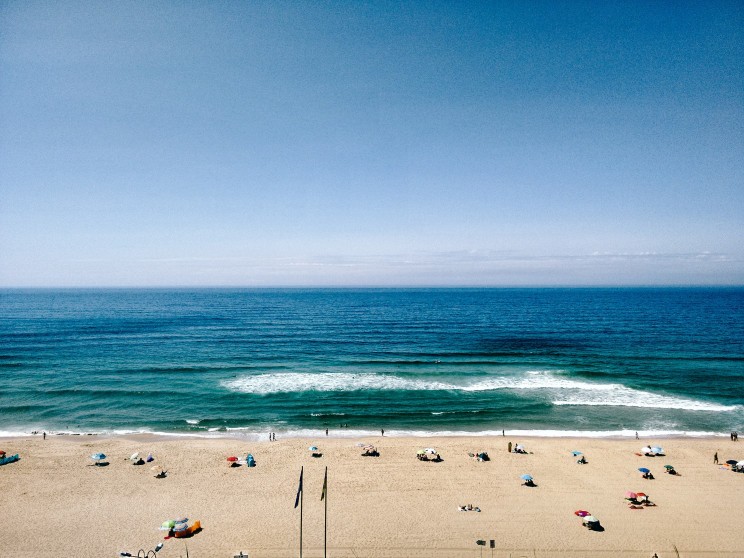
The weather is starting to make it feel more like summer in Portugal and after months of being stuck at home due to the COVID-19 pandemic, with the reopening of the country underway, the idea of going to the beach is definitely becoming more appealing. The good news is that there is already a date for the opening of beaches and, in turn, the bathing season as part of Portugal's reopening plan. From 6th June 2020, Portugal's famous sandy beaches will "reopen", but this year, and because of the coronavirus, there will be many restrictions. The Government has already stipulated the rules for going to the beach and taking a dip, from the distance to be kept between sun worshippers on the sand, to regulations in bars, restaurants, terraces and for playing sport. Let's have a look at our guide to going to the beach in Portugal this summer, so that you can go swimming and enjoy the holidays safely.
The risk of contamination through respiratory secretions (coughing and sneezing) of an infected person remains the direct means of transmission of the virus, things that also happen in these spaces. Therefore, "the use of beaches is no exception to the general measures set out to stop the spread of the COVID-19 pandemic, defined by the Directorate General of Health in Portugal (DGS). These measures recommend physical distance, avoiding the concentration of people, frequent hand washing, good respiratory hygiene, cleaning and sanitisation of spaces, as well as the use of a mask or visor, when necessary and appropriate", recalls the Portuguese Environment Agency (APA), which has prepared a long manual with guidelines.
Following all safety rules and standards is fundamental to minimise the worsening of the pandemic, and it is therefore necessary to reinvent the way in which beaches are enjoyed this summer 2020 and in the future. The Government also stresses the importance of maintaining physical distance and these basic health measures. The APA points out that "the greater or lesser security with which these spaces are going to be used depends essentially on the capacity to transmit to the citizens that they themselves must first of all take care of their risk situation".
Among the many measures defined, and in order to avoid an influx of visitors and crowds to beaches in Portugal, the relevant entities should indicate the state of occupation of bathing beaches through a traffic light system by displaying coloured signs: green (meaning low occupation), yellow (meaning high occupation) and red (meaning full occupation). On non-concessional bathing beaches, the responsibility for signalling the state of occupation of the beaches lies with the local authorities. The state of occupation of the beaches can also be consulted, in real time, through a mobile phone application called "Info Praia" or on the website of the Portuguese Environment Agency (APA).
Here is a summary of the main rules that must be respected at the beach in Portugal in 2020:
Use of the sand
- A minimum distance of 1.5 meters between people must be respected (unless they are part of the same group);
- A distance of three metres must be left between parasols;
- Sports activities with 2 or more people are forbidden (except water sports, surfing lessons and similar aquatic sports).
Circulation rules
- There must be a single direction of circulation, maintaining the same physical distance of 1.5 metres;
- Circulation corridors, parallel and perpendicular to the coastline or shore, may be defined according to the area available and the conditions of each beach.
Awnings, thatched umbrellas and canopies
- A minimum distance of 3 metres must be left between awnings or the typical thatched umbrellas often found n Portuguese beaches;
- There must also be a distance of 1.5 meters between the limits of canopies;
- A maximum of 5 people are allowed per awning, thatched umbrella or canopy;
- Each person or group can only rent these coverings in the morning (until 1.30pm) or in the afternoon (from 2pm).
Bars, restaurants and terraces
- Reorganisation of the terraces should be considered to ensure safety distance;
- Capacity limitations, under the terms applicable to the catering sector;
- Spaces must be regularly cleaned, at least four times a day.
Street vendors
- Mandatory use of masks and visors by sellers in contact with bathers.;
- Vendors must circulate at a physical distance from people and preferably through circulation corridors.
Equipment
- Pedal boats, slides and indoor showers are forbidden;
- Outdoor showers, sunbeds, mattresses or beach ashtrays must be cleaned daily or whenever the user changes.